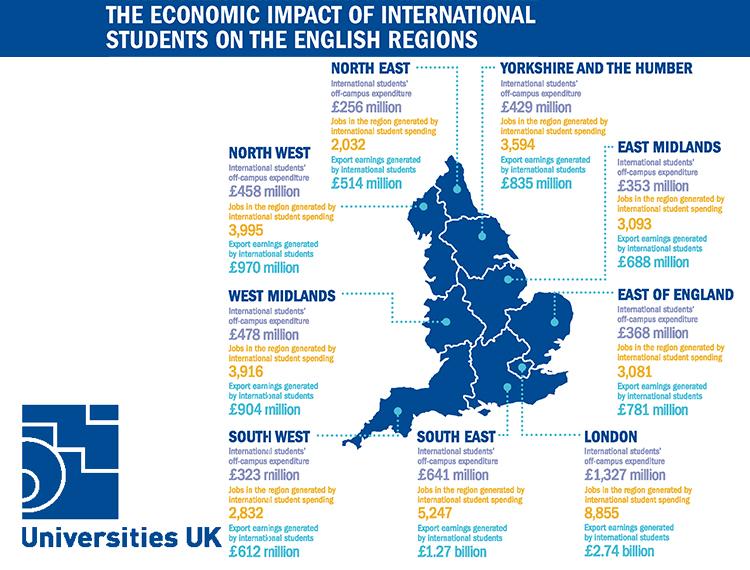New visa for international students would benefit UK

Universities UK has called for a new visa to allow international students to gain work experience in the UK for up to two years after graduation.
It comes as university leaders gather for the start of Universities UK’s annual conference, taking place this year in Sheffield (4-5 September).
In 2012, the UK government scrapped the post-study work visa which had allowed international (non-EU) students to stay in the UK and work for up to two years after graduation. This tightening of the eligibility rules for post-study work opportunities in the UK may have had a significant impact on prospective applicants from certain countries, including India.
The new visa would allow a wider range of employers – in all parts of the UK – to benefit from access to talented graduates from around the world, including small and medium employers who do not have Tier 2 sponsorship licences, usually due to the high costs and bureaucracy involved.
It would also make the UK a more attractive destination for international students and graduates, enabling it to compete with other popular destinations such as the United States, Australia and Canada, who have more welcoming student visa policies.
Since 2011, countries such as Australia, Canada, and the US have seen high growth in international demand for study, while the total number of enrolled international students in the UK has stayed flat, leading to lost market share.
The US and Canada offer international graduates the opportunity to stay and work for up to three years after graduation, and Australia for up to four years. New Zealand has recently announced reforms to its student visa policies and will now allow all international graduates to stay and work for up to three years, without the need for employer sponsorship.
The call comes as a new poll from ComRes (findings attached) reveals increased support for international students and graduates in the UK. Nearly three quarters (72%) of British adults polled think that international students should be able to stay in the UK post-graduation for one year or more to gain work experience.
Professor Dame Janet Beer, President of Universities UK and Vice-Chancellor of the University of Liverpool, said:
“The ability to work in a skilled job for a limited period after graduation is, for many prospective international students, an important part of the overall package when deciding where to study. We are proposing a new graduate visa that would make the UK more attractive to students and would allow a wider range of employers, in all parts of the UK, to benefit from access to talented graduates from around the world.
“This improved post-study visa would put us on a par with what is offered by countries such as the US, Canada and Australia. It would send a more welcoming message to international students and signal that the UK is open to talented individuals from around the world. As Brexit discussions continue, the UK needs an ambitious immigration policy that helps boost our regional and global competitiveness.”
Stephen Isherwood, Chief Executive at the Institute of Student Employers, said:
“Allowing talented international students to work for a period post-study in the UK will help employers, large and small, to fill skills gaps. As well as enabling growth, our universities will become more internationally competitive and it will mean that UK students can develop a global mindset too.”
Under this proposed visa, all higher education institutions registered as Tier 4 sponsors would be able to sponsor their graduates to search for and gain work experience in the UK for up to two years on a more flexible basis than currently permitted by the Tier 2 visa, without restrictions on job level or salary, and without an employer sponsorship requirement. Universities would have the flexibility to manage the licence for the new visa system separately from their Tier 4 licence. For more information on the proposal, visit the UUK website.
Currently, students must find a job with a salary of at least £20,800 at an employer with a Tier 2 sponsor licence within four months of completing their course, or find sponsorship as an entrepreneur. PhD students are separately able to stay for up to 12 months following completion of their degree. This new, proposed visa would give international graduates a longer period to search for a Tier 2 eligible role.
Australia, Canada, the US and New Zealand all offer international graduates the opportunity to stay and work for at least a year following graduation. The US and Canada offers up to three years and Australia up to four years, depending on the subject and qualification studied and length of original degree; New Zealand has recently announced changes which will allow graduates to stay for up to three years. In all four countries, this includes periods of job searching and there are no restrictions on the types of employers graduates can work for.
In 2011, under the previous Tier 1 Post Study Work visa, the numbers of students transferring into work visas was 46,875. Following the 2012 changes, that that fell in 2013 to just 6,238. We would expect similar proportions of students to want to stay and transfer into this visa were they to have the opportunity to do so. In 2010-11 there were 134,520 non-EU students who qualified, so around 35% of them chose to use Tier 1 or Tier 2 to transfer into work. If we use the 2016-17 data (the latest we have) to model what could happen with the new visa, we’d expect around 54,000 (35% of non-EU graduates in that year) to take up the opportunity.











Responses